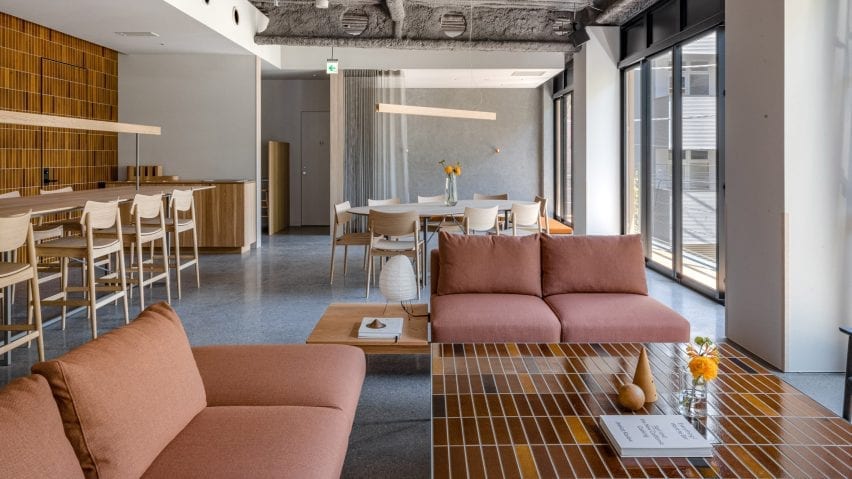Brick-like tiles with a volcanic ash glaze created by Formafantasma and textured concrete walls feature in this coffee shop in Shibuya, Tokyo, by Japanese studio Keiji Ashizawa Design.
Located a short walk from Tokyo's busy downtown area, this Blue Bottle Coffee outpost was conceived as an urban retreat sandwiched between two parks.
It serves coffee during the day and appetisers and natural wine in the evenings.
Keiji Ashizawa Design, which also designed the coffee brand's Yokohama outpost, wanted to create a warm and welcoming interior that brought the park surroundings into the glass-walled and concrete-floored space.
"It was a challenge to come up with a playful interior plan in this square two-storey building," Ashizawa told Dezeen.
"The other challenge was to make links between the first and second floors, and the exterior and interior."
To bring the outside in, the studio installed a large, curved tile counter that wraps around the cafe's kitchen area and welcomes customers as they enter.
The brown tiles – developed as a collaboration between London material manufacturer Dzek, and the Amsterdam-based design studio Formafantasma – are finished with a special volcanic ash glaze.
A single skilled artisan laid more than 7,000 of the tiles in the cafe. As well as the counter, they cover a low coffee table and a wall in the upstairs lounge area. Ashizawa said the tiles were specifically chosen to connect the interior and exterior spaces.
"We wanted a park-like item as a key material which stands out in the interior but also makes a strong connection between first and second floor, and the exterior and interior at the same time," explained Ashizawa.
"I thought that this tile, which has a brick-like colour, is an item reminiscent of parks in Japan," he continued.
"Also, there is the fact that the soil from volcanic ash is a familiar material in this Kanto region, and I remember that the soil floor of the original Kitaya Park was also Kanto loam."
In addition to the warm-coloured tiles, pink and orange textiles by Kvadrat, and wooden furniture by Karimoku, Ishinomaki Lab and Ariake add warmth to the largely glass and concrete interior.
On Blue Bottle Coffee's ground floor, tables are set at differing heights. The high counter with stools allows customers to watch the barista preparing their coffee, while the lower table provides a good view of the park.
More seating types are installed upstairs, including a lowered floor area with banquette seating upholstered in an autumnal orange textile. This space can be sectioned off from the main area by a grey, sheer curtain.
An oval dining table sits in the centre of the space providing a casual and communal dining option. A high counter table with a library-like light allows for quiet groups and singles to sit at the rear of the space.
At the far end, a low, tiled coffee table is surrounded by comfortable lounge chairs and sofas upholstered in muted pink fabric.
A textured, brushed mortar finish has been applied to the cafe's ceiling on the ground floor, and across a wall upstairs to help improve the acoustics in the space.
"When we plan cafes or restaurants, it is essential to think about acoustics," said Ashizawa. "It is important that you can speak easily and that you can hear the music comfortably."
"When we first saw the condition of the interior - the floor was made of concrete with glass walls. We definitely thought that we should leave the ceiling some kind of texture to promote sound absorption. At the same time, I thought that creating a feeling of touch in the space would have the effect of relaxing customers in the stressful city of Shibuya, like the greenery of a park."
"We hope that visitors will enjoy the warm atmosphere as if they had been invited to visit the welcoming house of a close friend," he concluded.
Photography is by Ben Richard and Masaaki Inoue.

